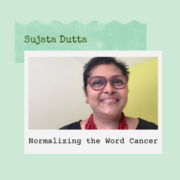Dr. Craig Cole: Why Is It Important for You to Empower Patients?
Dr. Craig Cole: Why Is It Important for You to Empower Patients? from Patient Empowerment Network on Vimeo.
How can patients and families be empowered? Expert Dr. Craig Cole from Karmanos Cancer Institute discusses methods of empowering patients in their care and the benefits of patient empowerment.
See More from Empowering Providers to Empower Patients (EPEP)
Related Resources:

|

|

Charise Gleason: Why Is It Important for You to Empower Patients? |
Transcript:
Dr. Craig Cole:
Well I think I’ll start with the why that’s important first. It is not only good patient care. I mean, it’s good patient care to have your patients empowered, that you’re not making decisions for them, but you have shared decision-making and work as a team. And so that’s, I think the biggest thing is it really is good patient care. It enhances compliance, it enhances the patient experience, the provider experience to have empowered patients.
The other thing is that it makes your job fun to have empowered patients. For me to walk into a room and a patient just says, “Well, I’m okay,” is one thing to have a patient, for me to walk in a room and say, “Well, I’m okay. So what’s new in myeloma?” And then being able to talk about that, because I can’t talk about this new myeloma at home anymore. I mean, my wife and kids are sick of hearing about myeloma. So who do I have to talk to? I have patients to talk to. And you can’t talk to unempowered patients. You have to talk to empowered patients. So it just makes your job fun to have an empowered patient. So, how do you do that?
And again, it’s good patient care. So how do you do that? Is that you start on day one and giving data to patients so that they see giving their data so that my patients go home with their bone marrow biopsy. They go home with their cytogenetic data. They go home with the data that they have so that they see that what happens in the clinic, what happens at home, that it’s not black and white, but there’s a continuum there, that they’re empowered and they have the data in front of them to see that this is really happening.
The second thing is offering options to patients that patients understand that is just not, a four drug therapy or two or one drug therapy, but there are options for therapy and that you can pick the best option for you as we go through sort of the risks and benefits. So I’ve been criticized by offering too many options to my patients, and I think that’s impossible to, that you can’t offer too many options because I don’t live in my patients’ shoes.
They’re the best ones to say, do I want to be here once a week, every week, for an hour or don’t want to be here once a week for two hours, three weeks out of four weeks, or do I want to not come in at all and get an oral therapy and they’re the best judge for that. So we offer things, including offering clinical trial space. So offering options gets them involved in the process, so they’re part of the empowerment.
Also referring them to educational resources. We have fantastic support groups and patient advocacy organizations here and around the world, and they’re very, very helpful. And when you see other empowered patients, it’s hard to not be empowered yourself when you see all the great opportunity. We also make sure the patient uses their portal so that if they have a question that they can communicate directly to me, they don’t have to wait a month in order to, it is very un-empowering to sit there with a rash for two weeks, as opposed to just, sending me a message to the portal. And probably most importantly, I think, is really listening and validating patients’ concerns.
There was a study that was done by the Cancer Support Community and their Patient Experience Survey, and that a lot of patients, over 50 percent of patients, don’t discuss financial toxicity, don’t discuss their behavioral health concerns, such as depression, because they think that the doctor can’t or the providers can’t do anything about it. And part of that is that if someone says, “Well, it’s kind of expensive for my drug,” and you don’t validate and listen to that, then they’re going to drop it and they may never bring it up again. Or if they say, “I’m having trouble with sleep and engaging other people,” basically saying that they have depression, if you don’t validate and listen to that, then they may never bring it up again, and they’re going to suffer with that along with their myeloma. So it’s really important as an empowering thing for patients for you to listen and validate what patients have and their concerns.










